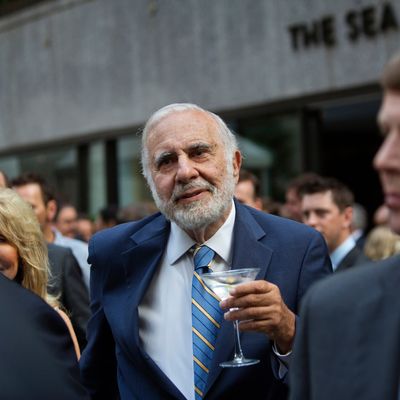
In one of his first acts as president, Donald Trump signed an executive order barring all lobbyists and industry lawyers hired as political appointees from regulating their former clients.
K Street sank into a draining swamp. The forgotten men and woman rejoiced — the special interests had been defeated; America, made great again.
Or so the most avid guzzlers of the president’s snake oil may have thought.
Once the order was duly signed and photographed, Trump proceeded to appoint dozens of lobbyists and industry lawyers to regulatory positions throughout the government — providing many with special waivers allowing them to regulate their former clients.
Then, when the Office of Government Ethics (OGE) asked the administration to publicly disclose which ex-lobbyists had been given waivers — so that it could make sure that no one was violating Trump’s rule without permission — the White House argued that OGE had no legal authority to request that information.
Such data requests are OGE’s primary tool for overseeing government ethics. Thus, the Trump administration’s act of defiance was an unprecedented attack on the office’s right to exist, and the public’s right to government transparency.
And yet: It’s hard to say what the OGE’s requested disclosures would teach us about Team Trump that we don’t already know. After all, while the Trump administration has occasionally tried to mask its contempt for the public interest, much of the time the White House advertises its kleptocratic nature as subtly as the president’s tower advertises his name.
Take Carl Icahn. The billionaire financier (and longtime Trump buddy) has ungodly sums of money invested in energy, auto parts, and mining. And last December, Trump named Icahn as his “special regulatory adviser” — tasking Carl with “reforming” the regulatory agencies that oversee his own investments.
Normally, such a flagrantly unethical appointment would be impossible. While the president is exempt from conflict of interest laws, his advisers aren’t. But Trump found a way around that bit of red tape — Icahn agreed to take on the role “informally,” performing his public service free of charge. This arrangement allowed Icahn to avoid the status of government employee, and all the mandatory disclosures and ethics rules that accompany it.
Icahn has found his volunteer work to be deeply rewarding. As Bloomberg reports:
CVR Energy Inc., [Icahn’s] oil refining company, saved about $60 million in the first quarter because of expectations that the federal government will ease a regulation involving renewable fuels, securities filings show … Icahn’s windfall results from potential changes in the George W. Bush-era law known as the Renewable Fuel Standard. It requires that billions of gallons of biofuel be added to the nation’s gasoline. Today, about 10 percent of U.S. motor fuel is made from corn, not oil.
The U.S. Environmental Protection Agency enforces this mandate by requiring refineries and importers to blend in ethanol and other biofuels, or buy credits from those who do the blending. The credits, called renewable identification numbers, or RINs, trade in an over-the-counter market. CVR’s refineries in Kansas and Oklahoma rely mostly on buying RINs. Icahn has said a spike in the price of the credits last year had cost the company $200 million annually. He became an advocate of changing EPA rules so fuel blenders, rather than refiners, face the compliance burden.
On March 9, Icahn said he was betting against the credits by delaying purchases in the expectation their value would fall. It has already been a shrewd wager for CVR, in which Icahn Enterprises LP owns an 82 percent stake. Prices for RINs have dropped 19 percent since Trump’s election.
Earlier this month, Democrats urged regulators at the Security Exchange Commission (SEC) to probe whether Icahn had used his advisory role to gain unfair trading advantages. Perhaps the SEC will seek the input of the White House special regulatory adviser.
It’s worth noting that Icahn hasn’t actually succeeded in changing EPA policy yet. Rather, markets have given him a $60 million reward merely for trying to subvert our democratic institutions for personal gain. In fact, since Trump’s election, the value of Icahn’s stake in CVR has increased by more than $600 million.
The mere appearance of corruption is corrosive to democracy — and profitable to the corrupt.






























